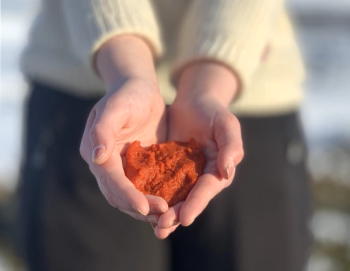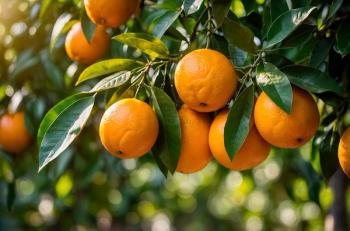
Olive Leaf: A Traditional Remedy Makes Its Comeback
From at least the point at which it was discovered that the incidence of heart attack is much lower across the Mediterranean than in other areas, the positive effects of a Mediterranean diet have been on everyone's lips. And the tasty "medicine" at the top of the list is olive oil. Its unsaturated fatty acids and antioxidant ingredients, such as the polyphenol oleuropein, provide protection against cardiovascular disease. What most people don't realize is that this health-promoting substance is found not only in fruit, but also in unequal higher concentrations in the leaves of the olive tree. Benolea, an olive leaf extract from Frutarom (Haifa, Israel), is scientifically proven to improve the heart's health and reduce the risk of heart attack. The extract can be used in a variety of functional foods and supplements boasting a heart-health position.
In 2004, nearly one in three adults in the United States suffered from high blood pressure,1 one of the risk factors that, in conjunction with other risks such as high blood cholesterol, obesity, or diabetes, could lead to stroke,2 the third major cause of death for both men and women in the United States.1 In addition, high blood pressure is a major risk factor for heart disease and diabetes.3
People often are unaware of the warning signs. Moreover, hypertension and obesity often develop over a long period of time. This is why the accumulation of risk factors is known as "the silent killer" or, more formally, metabolic syndrome development.
The first line of defense against premature death is to adopt a healthy lifestyle, starting with a balanced diet that includes five daily servings of fruit and vegetables, coupled with increased physical activity. Most people are aware that this is the advice, but very few take it to heart. Although almost three-quarters of adults have their blood pressure checked regularly, the World Health Organization (Geneva) estimates that only one-third of all people with hypertension actually try to control their blood pressure. Because many people struggle to eat an optimal diet, or maintain a healthy lifestyle, they may look to the convenience of dietary supplements and functional-food products to support them in their efforts to achieve their health goals.
THE OLIVE LEAF: AN ANCIENT REMEDY
The olive tree has a strong symbolic character-it stands for peace and strength. Since ancient times, people have used the oil and eaten olives, especially in Mediterranean cuisine. Historically, olive leaves were used to treat fevers, as well as for the topical treatment of wounds or infections. In Yemen, people used to eat and chew olive leaves, and it is reported that Yemenites never suffered from diabetes. Olive leaf tea is commercially available in Europe, and it is recommended in at least one traditional medicinal encyclopedia for use in the case of high blood pressure.4 Olive leaves are also used as a spice and are classified as flavorings in a Council of Europe publication.5
HEALTH SUPPORT FROM MOTHER NATURE
With Benolea (EFLA 943), Frutarom Switzerland Ltd. (Zurich) has developed an extract that has passed through the different steps of scientific testing, resulting in evidence that it can be used to reduce risk factors such as developing high blood pressure.
People prefer to use natural herbal remedies, as they are said to have fewer side effects than pharmaceuticals. Unfortunately, there are some herbal products on the market that have not been tested for their biological effects. Reputable manufacturers prefer to use high-quality, effective, and safe ingredients. Scientific tests have shown Benolea to conform to these aspects. Safety tests are available for Benolea as well as quality control measures such as the specified oleuropein range. Oleuropein is a substance specific to olives, and is attributed with blood pressure–lowering effects. Hydroxytyrosol, a degradation product of oleuropein, has antioxidant effects-and many olive leaf extracts are standardized for this compound. However, the blood pressure–lowering effect of olive leaves is exclusively attributed to oleuropein. Frutarom's gentle manufacturing process prevents the degradation of oleuropein to hydroxytyrosol. Benolea is manufactured in a pharmaceutical inspection cooperation/good manufacturing practices–certified production site according to a multicomponent system philosophy that sees the whole-plant raw material as active, not only its fractions or isolates.
CLINICALLY PROVEN EXTRACT
The latest research has demonstrated the positive effect of Benolea on heart health. Animal testing in hypertensive rats resulted in a significant reduction in blood pressure, in both a preventive and a curative way.6 In a parallel clinical study in Germany using Benolea, monozygotic twins with borderline hypertension (blood pressure >120/80 < 160/95) received a daily dosage of 500 and 1000 mg of Benolea in tablet form for eight weeks. Results confirmed a dose-dependent blood pressure–lowering effect, with maximum values of 13 mm Hg systolic and 5 mm Hg diastolic blood pressure. Accumulated data from trials indicate that a sustained reduction of 6 mm Hg in diastolic blood pressure reduces the risk of stroke by about 40%.7
The study also proved there was an additional benefit, namely a significant low-density-lipoprotein (LDL) cholesterol reduction. Increased levels of LDL are associated with atherosclerosis, and thus heart attack, stroke, and peripheral vascular disease. For this reason, LDL cholesterol is often called "bad" cholesterol. Tolerance of the extract was extremely high, with no evidence of side effects.
These results confirm the findings of the in vivo study with rats, which demonstrated a dose-dependent curative and preventive blood pressure–lowering effect. An additional effect of Benolea is that it supports healthy levels of blood sugar.
PRODUCTS FOR A HEALTHY HEART
Benolea is the only olive leaf extract studied in a human trial for its effect on maintaining a healthy level of blood pressure. On the basis of such scientific data, Benolea enables manufacturers to offer products with proven beneficial effects on heart health.
Benolea is stable in film-coated tablets and is a valuable food supplement. Furthermore, it is water soluble and can be used in still or carbonized drink formulations in appropriate dosages, taking into account national food regulations.
With approximately 50 million people in the United States showing suboptimal blood pressure, and the numbers ever increasing, the market for products that support healthy blood pressure levels is predicted to grow. This offers huge potential to supplement manufacturers and functional food companies to offer clinically supported products to this population group.
REFERENCES:
1. Division for Heart Disease and Stroke Prevention: Addressing the Nation's Leading Killers 2007, [online] (Atlanta: Centers for Disease Control and Prevention); available from Internet:
2. Healthy People 2010, [online] (Atlanta and Bethesda, MD: Centers for Disease Control and Prevention and National Institutes of Health); available from Internet:
3. Cardiovascular Health in Missouri, [online) (Jefferson City, MO: Missouri Department of Health and Senior Services); available from Internet:
4. W Wurzer, Die Grosse Enzyklopädie der Heilpflanzen (Klagenfurt, Germany:âÂÂNeuer Kaiser Verlag, 1994), 402–403.
5. Natural Sources of Flavourings: Report No. 2 (Strasbourg, France: Council of Europe Publishing, 2007), 221–222.
6. MT Khayyal et al., "Blood Pressure Lowering Effect of an Olive Leaf Extract (Olea Europaea ) in L-NAME Induced Hypertension in Rats," Drug Research, vol. 52, no. 11: 797–802.
7. Risk Reduction: Controlling High Blood Pressure, [online] (Centennial, CO: National Stroke Association); available from Internet:
For more information, contact Carla Wullschleger, product manager of the EFLA line, by sending e-mail to
Newsletter
From ingredient science to consumer trends, get the intel you need to stay competitive in the nutrition space—subscribe now to Nutritional Outlook.





